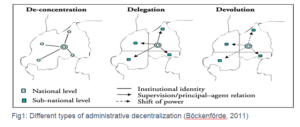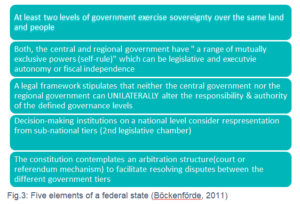Decentralization in developing countries is introduced by many scholars and international institutions as a viable solution to design tailored policies, respond to inefficient bureaucracy, fight corruption in order to facilitate demand-driven public services ‘delivery to the citizens of the developing nations. The proponents aim to increase governments’ accountability, responsiveness and a fairer and just governance approach to the citizens through pro-active participation in the political and socio-economic decision-making processes. On the other hand, opponents view decentralization as an approach that bears political and socio-economic risks which could affect the effectiveness of governance and being counter-productive to the set objectives of good governance, with a considerable impact on the political, economic, and social stability of developing countries, if the required pre-requisites are not in place.
This article provides an overview of (a) the different dimensions of decentralization, (b) the required pre-requisites and (c) the pros and cons of decentralized governance systems in the developing world.
Introduction:
During the last decades, many developing countries have initiated a shift of paradigm from the top-down hierarchal and centralized to a decentralized governance system with the aim to establish more accountable and responsive governance through engaging lower tiers of governance coupled with proactive participation of the local people in political and socio-economic processes. Government´s accountability and responsiveness of the public services to the community’s needs are the two main dimensions of impact that proponents of decentralization contemplate as the significant outcomes of the change.
Decentralization[1] of governance can be approached in different ways, such as administrative, fiscal, and political.
In the following, the different dimensions of decentralization will be explained, followed by discussing the required pre-requisites and the advantages and disadvantages of decentralized systems in developing countries.
Dimensions of decentralization:
Administrative decentralization can have three types– de-concentration, delegation, and devolution[2] – which depend on the degree of responsibilities and authority transferred from an upper-tier to a lower tier of government. De-concentration occurs when the central government transfers the implementation of a certain policy to the local level but is still responsible and has the power of decision-making. In contrast, delegation is the transfer of administrative responsibility and decision-making power for several public functions to the lower tier of governance. Delegation can be defined as a “principal-agent” relationship, whereas the central government is the principal and the local level the agent. Worth noting that the level of central control may vary and depend, among others, on the design and the nature of delegated functions. According to Böckenförde (2011), devolution constitutes the “strongest form of decentralization” and is linked to “the transfer or shift of a portfolio of authority” to lower tiers of governance on a regional or local level. Devolution can be designed and executed based on different models- from a limited power to execute national laws in a specifically defined area of governance to the provision of legislative powers which enable the lower tier of governance to adopt rules and regulations and device policies and strategies (“self-governance”).

Fiscal decentralization ascertains the level of financial autonomy and can refer to the transfer of taxation and revenue collection authority to lower governance tiers to raise and retain financial resources in order to fulfill their responsibilities. Another possible form of fiscal decentralization is called “intergovernmental transfers”[3] which deals with the share of revenues and equalization of imbalances between the different levels of government. Some scholars believe that administrative decentralization can only succeed if the local level is assigned with responsibility for expenditure, which means the part of the government responsible for the performance of the specific task should also pay for it. To ensure that, it is crucial to create the link between revenue collection, taxation, and the mentioned spending responsibility to increase the local governance institutions’ envisaged accountability.
Political decentralization is defined as the transfer of power or authority for certain areas of competence to local governments. This can be the transfer of power to select and appoint local officials from the upper to the lower tier of governance[4] or the transfer of authority for structuring governance on a regional or local level. In case of transfer of authority, the local government is not only instructed to implement but can have the regulatory and even law-making authority.

Another important term that is often used in the discussion on decentralization is federalism.
Although a federal system undoubtedly requires a certain level of decentralization and, therefore, can be defined as another type of decentralization, it still has a different meaning that is linked to the legal relationship of different parts of governance levels rather than the depth of decentralization- namely, the existing power distribution between central and sub-levels of governance. One can also say that while decentralization is a policy choice made by the central authority, a federative system has to be stipulated in the constitution of a country as a result of a constitutional amendment. According to Böckenförde (2011), five listed elements below feature a federal state from which the main pre-requisite- “one level of government cannot unilaterally revoke the existing distribution of powers”- for a federally administered state can be framed.

Considering the different types of decentralization that numerous countries have experienced in history, certain pre-requisites for the success of the envisaged change are deemed to be decisive success factors.
Pre-requisites for decentralization:
During the last decades, several leading think tanks and multilateral institutions have evaluated the reasons behind the poor public service delivery, inefficient bureaucracy, and the high level of corruption in developing countries. Decentralization was identified as a possible response to tackle the mentioned miseries that pave the way for a more effective governance approach.
However, a change to a decentralized governance system requires a specific set of pre-requisites essential for its success. According to Bardhan and Mookherjee (2006)[5], the existence of “educated and politically aware” citizens, the rule of law, fair elections as stipulated in the constitution[6] and equality in the society in terms of economic and social status of the people, are critical pillars for a functioning decentralized system. Moreover, a free and independent media landscape, formal and informal oversight institutions, and mechanisms, such as the judiciary, independent auditors, and civil society organizations, are additional critical pillars for the effective implementation of proposed decentralized governance set up. Besides the factors mentioned above, the envisaged fiscal autonomy of the local government´s administrative and economic efficiency must be on the same level as that of the central government, which in turn requires, among others, the same level of technical capacity of employees on sub-national level compared to civil servants at the national level. Mbate (2017)[7], in his comparative case study on Kenya, views the degree of technical capacity of the bureaucratic system at the local level as one of the decisive factors for a functioning local governance system.
Pros & Cons of decentralization in developing countries:
The main criticism that central governance systems face is the lack of accountability and responsiveness of policies and their effective implementation to deliver the required goods and services to the public. The high level of corruption within centralized governance systems in the developing world provides an additional justification for decentralization proponents who aim to counter the aforementioned vicious circle by establishing additional governance tiers and strengthening accountability and responsiveness at sub-national levels.
Because of their proximity, local government officials are better informed about the needs of the local citizens, therefore, they can respond effectively to their demands in terms of delivery of public services and goods. Another vital advantage of decentralization could be the greater transparency of the local government’s policies and services, which can be much better observed by citizens and the formal and informal oversight institutions. Moreover, scholars argue that decentralization can lead to increased political competitions, which in turn will increase political entrepreneurship and promote the earlier mentioned accountability and responsiveness aspects, which can enable the opposition or losing at the local level to serve as a “watchdog” who constantly put pressure on the ruling party to deliver the public services and goods to the people (Mbate, 2017). Another vital aspect cited in favor of decentralization is that the local authorities are more accountable to the local people they represent and do not have to solely satisfy the central government’s demands- leading to more accountability as a result of the monitoring function the citizens have in this context. Likewise, the responsiveness to the needs of the people also increases because of the spatial proximity and direct access to information from the communities. This can be further enhanced through the presence of civil society organizations and social activists who can monitor and, if required, take measures to discipline the local politicians and civil servants.
Another aspect raised by Mbate (2017) is inter-jurisdictional and yardstick competition, particularly in countries with “weak electoral systems,” where incentives such as taxation and investment policies can boost private sector engagement to increase the revenue of the community. This concept presumes that production factors such as capital and labor are mobile; therefore, they can move to another jurisdiction if the required work and business environment are not appropriate.
However, many arguments oppose the assumption that decentralization contributes to more effective and transparent governance.
As emphasized by Rhode (2006 cited in Mbate, 2017), decentralization can cause the well-known soft budget constraints, which will lead to an increase of “fiscal pressure, debt default and increased risk of macroeconomic instability,” as the local officials “expect” the central government to be the firefighter and fill the gap. This issue can become a “bad habit” in the long-term, leading to a further increase of fiscal deficits, which could contribute to corruption on the local level owing to local officials ‘overspending of the budget. As the central government officials can be blamed by the voters for the mismanagement putting their re-election in danger, the central authorities often have to “retreat” from their position and compensate the local tiers. This vicious circle can create opportunities for local politicians through overspending the allocated budget without the expected transparent and demand-driven provision of services and goods to local citizens.
Another important argument that scholars present as a disadvantage of decentralization is the “capture by local elites and powerful interest groups.” This phenomenon empowers local elites, strong men, and tribal leaders to influence economic and political decision-making processes by “capturing the power” (Mbate, 2017) within the local institutions. Jones[8] (2013 cited in Mbate, 2017) points out in his study on the Philippines that local elites have influenced procurement allocations and were involved in “over-pricing” in communities with the intention to provide financial means for the election of their favorite local officials. This issue is even worse in a country with volatile security, where local strongmen have their armed militias, which may even force the committed officials to “cooperate” in order to save their lives. Moreover, such a situation can also cause limitations to media and other pressure groups to access such jurisdictions and shed light on the mismanagement of local structures. Obviously, public participation will not be possible under such circumstances as people will avoid confrontation with the local strongmen who, besides financial means, could also have armed militias to threaten the citizens.
Another issue which is pointed out by Mbate (2017) is the possible occurrence of conflict between central and local government, as a result of clashes over functions and responsibilities coupled with resistance towards change and the readiness of taking responsibility for policy outcomes, in particular when both instances fund development projects. The mentioned conflict can deepen when the ruling central government favors those constituencies that have voted for them and neglect communities that have supported the opposition. This is not only an issue that occurs in developing countries but even countries like Italy or Argentina have experienced favoritism reflected in the allocation of financial resources. Therefore, decentralization can increase conflicts among different governmental tiers, which is opposed to its proponents’ envisaged complementarity objective. Another important argument which is mentioned is the lack of technical and administrative capacity on a local level that not only result in “poorly designed policies,” but which is also opposing to the arguments of qualitative improvement of public service delivery and transparency (Bhadar and Mookherjee, 2006; Mbate, 2017).
A final counter-argument that is contemplated as a disadvantage of decentralization is the widening of inter-regional inequalities, resulting from “initial conditions, such as resource endowment, geographical location, income levels, and human development indicators” (Mbate,2017). Consequently, local units where the initial conditions are in place can achieve higher tax collection rates and provide better services to their citizens than poorer units.
Considering the fact that especially in developing countries, the aspect of a “solidarity surcharge,”- where wealthier units are obliged to provide financial support to poorer units, might be neglected- may cause conflicts that could have consequences for the entire country.
In particular, in countries with local strongmen, this aspect could bear enormous risks and could even pave the way for armed conflicts. A final aspect that refers to post-conflict societies is mentioned by Böckenförde (2011), who call to apply “caution and prudence” while designing the appropriate type of decentralization to “avoid reverse effects.” Otherwise, as mentioned by the author, the weakness of local institutions and the absence of the required human capacity may result in “an incompetent and corrupt local government, whereas ill-tailored ethnic decentralization may fuel secessionist movement even more.”
Conclusion & Recommendations:
Considering the pros and cons of decentralization discussed above, it is evident that the discourse on decentralization should not be viewed as either white or black, but it has to be considered as a process that requires careful assessment in the context of the country where the system is to be implemented. Here, it is vital that all critical aspects, such as history, political and socio-economic status, and cultural aspects of the country are contemplated in order to gain a realistic picture of the viability and the impact of the envisaged positive change in the society.
The principal actors of decentralization have to contemplate pre-requisites, such as the rule of law, fair elections, presence of free and independent media and oversight institutions, and the existence of educated and politically aware citizens as the foundation for the success of decentralization and should not ignore them in favor of motives supported by specific interest groups. Otherwise, it is very likely that the shot will backfire, and the outcome of decentralization will be even worse than a corrupt and inefficient central governance system.
It can be concluded that decentralization shall not be “oversold” as a panacea to governance inefficiency and ineffectiveness in developing countries, as promoted by specific political streams that link the formation of additional governance tiers on provincial and district level to the manifestation of their power and self-interest under the plea of more accountability, responsiveness, and transparency.
Alias Wardak is an expert on energy, water & regional cooperation and a former policy advisor to Afghanistan’s Ministry Finance. He is a lecturer and member of the Institute for International Planning & Management at the University Of Siegen, Germany. He can be followed on Twitter: @AliasWardak.
[1] Note:” Upward decentralization,” which is better known as regional integration or internationalization, is also considered a form of decentralization but is not a focus of this article, Refer to: (https://www.corteidh.or.cr/tablas/28321.pdf)
2(Böckenförde, 2011), A Practical Guide to Constitution Building: Decentralized Forms of Government Available at: https://www.corteidh.or.cr/tablas/28321.pdf
3 (Böckenförde, 2011 )-see link under 2
4 In case an electoral mechanism is in the place where the citizens can elect their representatives, this element can also be referred to as electoral decentralization (Böckenförde, 2011, page 20)
5(Bradhan and Mookherjee, 2006)- Decentralization and Local Governance in Developing Countries Available at: (https://mitpress.mit.edu/books/decentralization-and-local-governance-developing-countries)
6 That shall prevent the office-holders from taking advantage from their current position(s)
7 (Mbate,2017)- Decentralisation, Governance, and Accountability: Theory and Evidence, Available at: https://www.kas.de/c/document_library/get_file?uuid=0edd0243-4dcc-9760-6f3d-12657c4963e8&groupId=280229
8 Study on the impact of elite capture and informal bureaucracy in the Philippines








GET IN TOUCH
NEWSLETTER
SUGGEST A STORY
PAJHWOK MOBILE APP